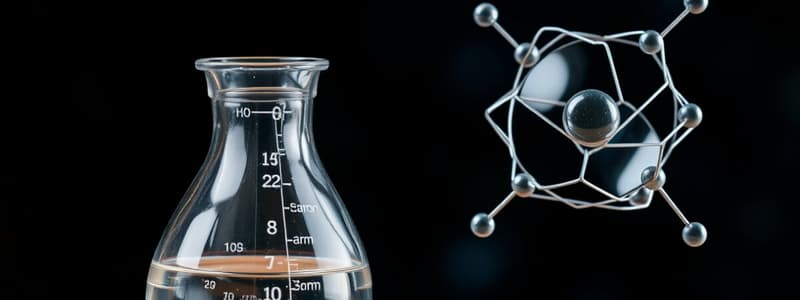Podcast
Questions and Answers
What is the main focus of natural sciences?
What is the main focus of natural sciences?
- Study of abstract concepts
- Study of patterns and logic
- Study of the physical world (correct)
- Study of living organisms
Which step comes first in the scientific method?
Which step comes first in the scientific method?
- Observation (correct)
- Analysis
- Hypothesis
- Experimentation
What characteristic means scientific knowledge is based on observed evidence?
What characteristic means scientific knowledge is based on observed evidence?
- Empirical (correct)
- Falsifiable
- Progressive
- Repeatable
Which of the following is an example of an applied science?
Which of the following is an example of an applied science?
What does it mean for a hypothesis to be falsifiable?
What does it mean for a hypothesis to be falsifiable?
Which current trend in science focuses on sustainability?
Which current trend in science focuses on sustainability?
Which of the following statements about scientific theories is true?
Which of the following statements about scientific theories is true?
Which of these tools is primarily used for data collection in natural settings?
Which of these tools is primarily used for data collection in natural settings?
Flashcards are hidden until you start studying
Study Notes
Definition of Science
- Systematic study of the natural world.
- Involves observation, experimentation, and analysis.
Branches of Science
-
Natural Sciences
- Focus on the physical world.
- Subdivisions:
- Physics: Study of matter and energy.
- Chemistry: Study of substances and their interactions.
- Biology: Study of living organisms.
-
Formal Sciences
- Concerns abstract concepts and logic.
- Includes mathematics, statistics, and computer science.
-
Applied Sciences
- Uses knowledge from other scientific fields to solve practical problems.
- Examples: Engineering, medicine, environmental science.
Scientific Method
- Observation: Noting phenomena.
- Question: Formulating questions based on observations.
- Hypothesis: Proposing a testable explanation.
- Experimentation: Conducting experiments to test the hypothesis.
- Analysis: Interpreting data collected from experiments.
- Conclusion: Drawing conclusions and refining hypotheses.
Importance of Science
- Enhances understanding of the universe.
- Drives technological advancements.
- Informs public policy and health decisions.
- Encourages critical thinking and problem-solving skills.
Characteristics of Scientific Knowledge
- Empirical: Based on observed and tested evidence.
- Repeatable: Experiments should yield consistent results when repeated.
- Falsifiable: Must be possible to prove a hypothesis wrong.
- Progressive: Builds on previous knowledge and evolves over time.
Ethical Considerations in Science
- Ensuring the integrity of research.
- Considering the implications of scientific discoveries.
- Responsible conduct in experimentation.
Current Trends in Science
- Interdisciplinary research.
- Advances in biotechnology.
- Climate science and sustainability.
- Artificial intelligence and computational science.
Tools and Techniques
- Laboratory Equipment: Microscopes, spectrometers, etc.
- Field Studies: Collecting data from natural settings.
- Statistical Analysis: Interpreting experimental data.
Major Scientific Theories
- Theory of Evolution: Explains the diversity of life.
- Germ Theory: Links microorganisms to disease.
- Theory of Relativity: Revolutionized understanding of space and time.
Definition of Science
- Systematic study aimed at understanding the natural world through observation, experimentation, and analysis.
Branches of Science
- Natural Sciences: Explore the physical universe.
- Physics: Investigates matter and energy interactions.
- Chemistry: Focuses on substances and their chemical interactions.
- Biology: Studies living organisms and their processes.
- Formal Sciences: Concerned with logic and abstract concepts.
- Includes disciplines like mathematics, statistics, and computer science.
- Applied Sciences: Utilizes knowledge from natural and formal sciences to address real-world issues.
- Examples encompass engineering, medicine, and environmental science.
Scientific Method
- Observation: Identifying and noting phenomena in the environment.
- Question: Developing questions based on initial observations.
- Hypothesis: Formulating a testable explanation for observations.
- Experimentation: Carrying out experiments to assess the validity of the hypothesis.
- Analysis: Evaluating and interpreting data gathered during experiments.
- Conclusion: Drawing conclusions to support or refute the hypothesis, leading to further refinement.
Importance of Science
- Deepens comprehension of the universe and natural laws.
- Fuels technological progress and innovation.
- Informs policies related to public health and environmental issues.
- Cultivates critical thinking and enhances problem-solving abilities.
Characteristics of Scientific Knowledge
- Empirical: Grounded in verifiable evidence gathered through experimentation and observation.
- Repeatable: Consistency in experimental results upon replication.
- Falsifiable: Hypotheses must be structured in a way that allows for potential disproof.
- Progressive: Knowledge evolves, with new discoveries building on past understanding.
Ethical Considerations in Science
- Upholding integrity within research processes.
- Reflecting on the broader implications of scientific advancements.
- Maintaining responsible practices during experimentation.
Current Trends in Science
- Growth in interdisciplinary research, merging various scientific fields for innovative approaches.
- Significant developments in biotechnology, enhancing medical and agricultural practices.
- Increased focus on climate science and sustainable practices to address environmental challenges.
- Advancements in artificial intelligence and computational science, revolutionizing data analysis and application.
Tools and Techniques
- Laboratory Equipment: Tools such as microscopes and spectrometers critical for experiments.
- Field Studies: Collecting empirical data from natural environments for practical insights.
- Statistical Analysis: Essential for interpreting and drawing conclusions from experimental data.
Major Scientific Theories
- Theory of Evolution: Offers insights into the origin and diversity of life forms on Earth.
- Germ Theory: Establishes the connection between microorganisms and the occurrence of diseases.
- Theory of Relativity: Changed the understanding of space, time, and gravity in physics.
Studying That Suits You
Use AI to generate personalized quizzes and flashcards to suit your learning preferences.




